
The Alaska Legislature still is working on the state budget, nine days after the scheduled end of the legislative session under state law. The outcome could depend on the House and Senate resolving their differences over what to do with Alaska Permanent Fund earnings.
The following is a rough transcript of Alaska News Nightly host Lori Townsend asking KTOO and Alaska Public Media’s Andrew Kitchenman about the process.
What’s been happening with the budget?
The House passed its version of the budget and the Senate passed its version. But there are a lot of differences between the two versions. There’s a conference committee that’s met a couple of times. It’s been reaching agreement over the parts of the budget where the two chambers aren’t too far apart.
But we still don’t know what will happen with the parts where there are bigger differences. For example, the Senate budget includes $13.5 million less for the University of Alaska than the House. The part of the budget the Legislature directly controls will be $5.5 billion. Or maybe a little less.
How will the Legislature pay for the budget?
Well, this is the year the state will tap permanent fund earnings to pay for state government. Basically, no one sees an alternative.
But the big question is whether that draw from earnings will be done under the terms of a plan.
There’s a bill to enact that plan — Senate Bill 26 — where the legislature draws roughly 5 percent of the permanent fund’s market value each year. It’s been talked about for a long time, but there was some movement on it this week.
The Permanent Fund Corp. is urging the Legislature to pass a plan – so that they’re able to manage fund investments more effectively.
Until now, members of the House majority have said they would only agree to an earnings draw if there was also a tax on income or higher taxes on the oil and gas industry. But on Saturday, a conference committee met to discuss the bill to draw from the permanent fund. They have asked for the power to negotiate details of the draw.
What are they looking at?
One issue is how to address permanent fund dividends. The Senate version of the plan would devote a quarter of the earnings draw for PFDs. The House would spend a third of the draw on dividends. And Gov. Bill Walker proposed a compromise of 30 percent.
But the budget that both chambers have passed this year spends more than any of those proposals on PFDs. So there’s already a difference between the proposed budget and the proposed draw on fund earnings.
What other bills are lawmakers talking about?
The pace of passing bills has picked up since Day 90. Several bills to extend boards and commissions have passed. House Finance heard public testimony today on a bill to use bonds to pay for oil and gas tax credits.
A bill that would allow judges to use out-of-state criminal records to determine whether people charged with crimes will be released pretrial is still possible.
And lawmakers will likely turn to the capital budget once they have a clearer sense of what they’re doing with permanent fund earnings and the operating budget.
Is there any sense when the session will end?
There’s been some talk that it could end within the next week. Housing in Juneau is getting hard with the start of the cruise ship season. Lawmakers will likely be gone before the constitutional deadline to end the session. That’s May 16.
Andrew Kitchenman is the state government and politics reporter for Alaska Public Media and KTOO in Juneau. Reach him at akitchenman@alaskapublic.org.




